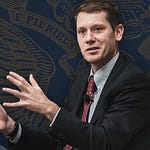Eric and Eliot share reflections on Memorial Day (and the proper way to observe it), analyze the Turkish election results and Turkey's future course as a regional power, discuss the rise of religious authoritarianism and populism around the globe, and mark Henry Kissinger's one hundredth birthday with a discussion of his complex and complicated legacy as a statesman.
Shield of the Republic is a Bulwark podcast co-sponsored by the Miller Center of Public Affairs at the University of Virginia. Email us with your feedback at shieldoftherepublic@gmail.com
Learn more about your ad choices. Visit podcastchoices.com/adchoices












Memorial Day, Election Day, and a Birthday